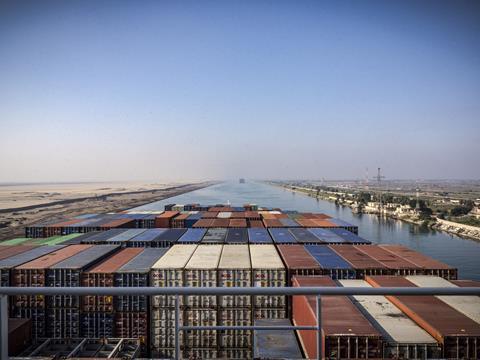Despite hope the Israel-Hamas truce will last, a resumption of trade through the Suez Canal is expected to take time

Fresh produce trade through the Suez Canal is unlikely to return to levels seen before the recent conflict in the region, despite the signing of a ceasefire deal between Israel and Hamas, logistics experts say.
Executives from shipping, insurance and retail industries told Reuters that the risks remained too high to resume voyages through the Bab al-Mandab at this time.
“It’s not likely the industry will see a large shift back to the Suez Canal in the short term,” said Matt Castle, vice president of global forwarding with logistics group CH Robinson.
“It’ll definitely be a case of trialing the route,” said Craig Poole, MD at Cardinal Global Logistics, ”making sure that the ceasefire is genuine.”
Maritime security sources suggested that firms would treat the Houthis’ pledge with caution and would undertake test voyages to assess the risk.
“As you can understand, nobody’s in a hurry to change things from tomorrow,” an executive with a major container ship company told TradeWinds. “Redirecting towards Suez will come, but gradually.”
The number of container ships passing through the Suez Canal in 2024 was down 75 per cent compared with 2023, according to data from Project44, largely as a result of attacks on commercial vessels by Houthi rebels in Yemen, apparently acting in solidarity with Palestinians affected by Israel’s war in Gaza.
The ceasefire deal could theoretically allow the return of international ships to the Red Sea. “If Israel stops the aggression in Gaza, and if the US, UK and Israel stop the aggression against Yemen, the Houthis will stop their operations, including attacks against navies and commercial ships,” Houthi spokesperson Mohammed al-Bukhaiti told Al Jazeera.



